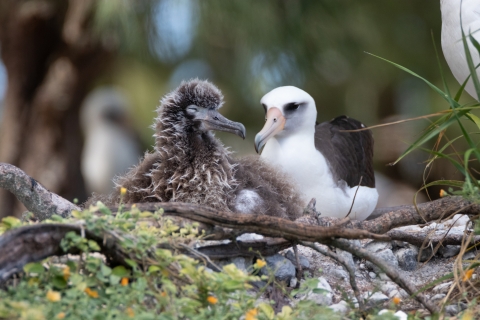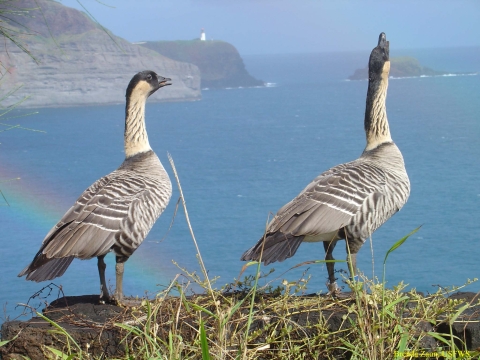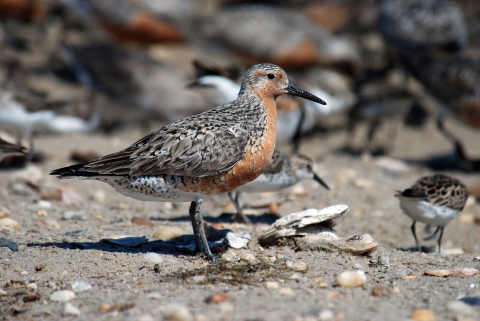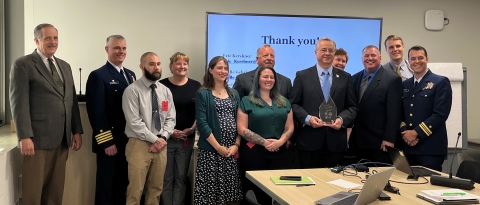Since 2009, the Council for the Conservation of Migratory Birds (Council) has been overseeing the implementation of Executive Order 13186, Responsibilities of Federal Agencies to Protect Migratory Birds. The Council serves as a platform for coordination and communication among federal agencies regarding their responsibility for the conservation of migratory birds under bilateral treaties. It aims to enhance collaboration, improve opportunities for federal activities to protect and conserve migratory birds, and recognize the positive impacts agencies are having on bird populations.
The Presidential Migratory Bird Federal Stewardship Award is one way the Council annually recognizes projects or actions conducted by, or in partnership with, a federal agency that meets the intent and spirit of Executive Order 13186, by focusing on migratory bird conservation. Such projects may involve reducing adverse impacts to migratory birds and their habitats, restoring migratory bird habitat, and incorporating migratory bird conservation into their unique agency plans and activities. Projects are scored based on several criteria, including the scale of influence in terms of geographic area; partnership; influence on others’ actions (including policies within their agency and other agencies and organizations); level of innovation; and effectiveness, including the number of species of concern that have benefitted from the project.
After a series of delays due to the coronavirus pandemic, FWS Deputy Director Steve Guertin was pleased to present awards to the 2021 and 2022 Presidential Migratory Bird Federal Stewardship Awardees: The Department of Homeland Security’s U.S. Coast Guard (USCG) Sector Delaware Bay and the U.S. Department of Agriculture’s (USDA) Animal and Plant Health Inspection Service (APHIS) Wildlife Services. Both award winners were honored at this year’s Council meeting.
About the Winning Projects
The 2021 Award was presented to the USDA’s APHIS Wildlife Services program in recognition of their efforts to reduce human-wildlife conflicts associated with the threatened Hawaiian goose, or nēnē, and the Laysan albatross, or mōlī, two culturally important species in Hawaiʻi. For this project, they integrated research with management operations and worked with federal, state and local partners to not only reduce aircraft strike hazards presented by these species, but also to identify, preserve, enhance, and support breeding and foraging habitats for the birds elsewhere on the island. They used innovative nonlethal management tools like using canine teams for bird dispersal, mitigation translocation, and egg swaps. They also implemented research using radio and satellite tracking technology to monitor and gauge the impact and effectiveness of these methods. There were many partners who contributed to the successes of this project, including U.S. Geological Survey, Bird Banding Laboratory; U.S. Department of Defense, U.S. Navy; U.S. Navy Pacific Missile Range Facility; Federal Aviation Administration; state agencies: Hawaiʻi Department of Transportation; Lihue Airport; Hawaiʻi Department of Forestry and Wildlife; and non-governmental organizations including the Hokuala Resort, Kauai Albatross Network, Na Aina Kai Botanical Gardens, Pacific Rim Conservation, and private consulting firms.
The 2022 Award was presented to the USCG Sector Delaware Bay “Collaborative Oil Spill Planning to Protect Migratory Birds” project, recognizing the collective efforts of the OR&R's Emergency Response Division, U.S. Environmental Protection Agency, U.S. Department of the Interior, U.S. Fish and Wildlife Service, Tri-State Bird Rescue and Research, Inc., and the States of Delaware, New Jersey, and Pennsylvania. Sector Delaware Bay oversees one of the most densely populated commercial vessel corridors in the States. The Delaware River Port Complex (including docking facilities in PA, NJ and DE) is also the largest freshwater port in the world, where nearly 42 million gallons of crude oil are moved through the river basin every day. This waterway is in the middle of the Atlantic Migratory Bird Flyway where a large majority of the endangered rufa red knot population uses the Delaware Bay as a critical feeding habitat when horseshoe crabs lay their eggs along the bay’s sandy shorelines. Members of the Sector Delaware Bay Area Committee (the Committee) developed a standardized matrix for federal, state, and local responders to protect migratory birds, as well as numerous other endangered species, including marine mammals and turtles. The Committee developed tools that would not only identify threatened and endangered species which may be present during an oil or chemical spill in the area, but also developed best management practices to protect these species and their critical habitats.
The Council and the many projects nominated for its Presidential Migratory Bird Federal Stewardship Award exemplify the power of partnership in a shared commitment to the protection of migratory birds. As the Endangered Species Act turns 50 this year, we are proud to celebrate these winning projects which have not only benefited migratory bird species but have also contributed to conservation efforts for endangered and threatened migratory bird species.








